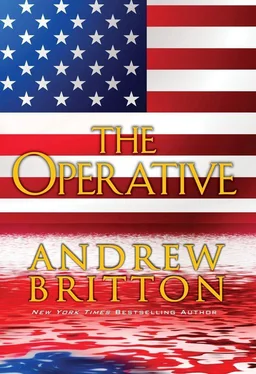Andrew Britton - The Operative
Здесь есть возможность читать онлайн «Andrew Britton - The Operative» весь текст электронной книги совершенно бесплатно (целиком полную версию без сокращений). В некоторых случаях можно слушать аудио, скачать через торрент в формате fb2 и присутствует краткое содержание. Жанр: Триллер, на английском языке. Описание произведения, (предисловие) а так же отзывы посетителей доступны на портале библиотеки ЛибКат.
- Название:The Operative
- Автор:
- Жанр:
- Год:неизвестен
- ISBN:нет данных
- Рейтинг книги:5 / 5. Голосов: 1
-
Избранное:Добавить в избранное
- Отзывы:
-
Ваша оценка:
- 100
- 1
- 2
- 3
- 4
- 5
The Operative: краткое содержание, описание и аннотация
Предлагаем к чтению аннотацию, описание, краткое содержание или предисловие (зависит от того, что написал сам автор книги «The Operative»). Если вы не нашли необходимую информацию о книге — напишите в комментариях, мы постараемся отыскать её.
The Operative — читать онлайн бесплатно полную книгу (весь текст) целиком
Ниже представлен текст книги, разбитый по страницам. Система сохранения места последней прочитанной страницы, позволяет с удобством читать онлайн бесплатно книгу «The Operative», без необходимости каждый раз заново искать на чём Вы остановились. Поставьте закладку, и сможете в любой момент перейти на страницу, на которой закончили чтение.
Интервал:
Закладка:
That essentially clinched the tweets’ authenticity as far as Siegel was concerned, but to add further confirmation, he went back in Colwriter123’s timeline to search through the updates he’d posted in the hour or so leading up to the attack. Colwriter123 had been a busy, prolific correspondent during that period, tweeting about everything from the degree of courtesy and helpfulness at individual booths to the high price of fast food at the concession stands. He had even included observations on security lapses, which Siegel himself found troubling, and had hashtagged his tweets with the term #BaltimoreCareerFair to make them easy to follow. From the event mark forward, Colwriter123 had been sending updates that read like combat reports from the front lines. The kid was impressive: not only did he have courage, but he was showing a composed, perceptive eye for what was important.
Running down Colwriter123’s post-event timeline, Siegel examined the replies to his tweets from other users. Each of these showed the respondent’s username after the @ symbol, enabling Siegel to click on his or her profile and see whether it offered anything of interest. Like criminals returning to the scene of a crime, terrorists were known to follow reactions to their sociopathic activities.
The tone of the responses ran the predictable gamut, ranging from deeply concerned to callously idiotic, but Siegel didn’t immediately see anything useful in them. Then he noticed repeated tweets from someone with the username AlDearborn. A relative, possibly the young man’s mother. The posts looked like direct communications with the kid from someone who was trying to help him, which was more than enough to grab Siegel’s eye on its own. But the most recent post made him stare at the screen with acute fascination, a long, low whistle escaping his lips.
“You got something?” Karl asked.
“Maybe.”
She was too involved in her own research to look over. Siegel read the tweet again. It had been sent just two minutes ago, according to the timeline, and it read:
Leave yr phone somewhere w/vol LOUD. In 5 min. it will ring, DO NOT answer. #BaltimoreConventionCenter // Stand by.
Siegel hastily clicked on the user’s account profile. It belonged to Baltimore psychologist Allison Dearborn-and she was CIA. But what was the purpose of those instructions she gave him about his phone? The hashtagged term had popped out at him, too. Baltimore Convention Center. Ms. Dearborn had clearly wanted her tweet to attract the attention of someone other than Colwriter123. Someone a CIA employee must have hoped would be monitoring Internet traffic for messages from the center.
Someone like himself.
He was not about to sit around guessing, nor did he intend to just flag the tweets and kick them upstairs. These looked much too critical.
“Clare, hold the fort. I’ll be back,” Siegel said, springing from his seat.
Karl looked at him inquisitively. “What is it?”
Siegel didn’t answer. He was already hustling up the aisle, feeling like a ticking clock thundercloud had just appeared over his little boat on the pond…
Word reached Max Carlson in a circuitous fashion, which was unbecoming for the secretary of Homeland Security.
With his cell phone deposited in the small lead-lined cabinet outside the woodshed-which was what Carlson and other old-timers called the Situation Room-he’d been out of touch with the Office of Operations Coordination’s acting director, Joseard Levy, who had oversight of the NOC and was responsible for keeping Carlson in the loop. Under most circumstances, Levy would have left Carlson a routine voice message. For a higher priority communication, Levy would have routed a call to the Situation Room, where a watch officer would have informed Carlson of its receipt; if the secretary felt the message warranted an immediate callback, he would excuse himself from the presidential huddle and return the call from one of the encrypted privacy phones that sat in soundproofed booths outside the conference room. But the information that had come out of the NOC was of such crucial importance that DHS protocol required it be conveyed directly to the president himself in the event that Carlson wasn’t immediately available.
That was precisely what occurred, even though Levy was always kept informed of Carlson’s whereabouts and had known he might be found not 10 feet apart from the president inside the Situation Room. So when a watch officer called to inform Brenneman that OOC director Levy was on the phone with urgent news, Carlson couldn’t have realized it was coming from his own department, least of all Joseard Levy, his right-hand man.
The call lasted less than a half minute, during which time the president said nothing other than “Yes?” when he picked up and “Thank you” when he put down the receiver. Then he briefed the others. The Homeland Security chief hadn’t viewed it as a personal slight; ego had nothing to do with this. It just felt odd to have the commander in chief tell him what his own people had learned: that within the last five minutes instructions were sent to one of the hostages, Colin Dearborn, a student at the University of Virginia, from an account belonging to his aunt Allison Dearborn.
To his credit, Brenneman turned first to Carlson to ask his opinion. The Homeland Security chief quickly put his personal feelings aside to digest the latest development and advise the president.
“The five minutes would have just expired,” Carlson said. He was already busy accessing the file with the tweets of Colwriter123. “Joe, any changes in the grid?”
The SIOC chief was looking off camera. “Checking,” he said, drawing out the word. “Thermal imaging shows movement in one of the rooms. It’s in two-twenty-four.”
CIA director Andrews had brought up Kealey’s RAP sheet-his Retirement Assessment Profile. Though Kealey’s sessions with Allison Dearborn were confidential, psychotherapists were required to file a brief analysis on all retiring personnel with high-level security clearance or a history of “personal enforcement”-a polite way of saying they’d killed someone on the job. The RAP was a series of twenty-five questions with boxes marked VERY LIKELY, LIKELY, and NOT LIKELY. The RAP sheet was designed to flag agents who had a history of money problems or would miss the excitement of government-sanctioned murder. For these people, personal issues such as divorce, unemployment in the civilian sector, or dissatisfaction with political issues could drive them to sell information to foreign operatives or commit violent acts.
Kealey had scored extremely low on the “selling information” likelihood, just 2 percent, and very high on the “likelihood of violence”. If he happened to come upon a situation like the current one, the formula said there was a 90 percent chance he would not only become involved but would find a way, in Dearborn’s own words, to “finesse the scenario toward his strengths.”
Finesse was not a word Andrews would apply to Kealey. He had once described the agent as the nuke they’d fire at an asteroid rushing toward earth. But Kealey also knew Julie Harper, knew where she was. Andrews had no doubt that her safety was in his mental heads-up display, and there was no one Andrews would rather have on-site than him.
“Mr. President,” Andrews said, “Kealey would know we’re monitoring chatter on the SocNets-”
“I think we all got that part,” Shirley Choate interrupted. “He was your guy. What’s his game?”
The National Intelligence head was the former Detroit chief of police. Her aggressive tactics had brought peace to the impoverished city and an impatient muscularity to the president’s team. While they all respected her judgment and out-of-the-box thinking, her style did not make her any friends.
Читать дальшеИнтервал:
Закладка:
Похожие книги на «The Operative»
Представляем Вашему вниманию похожие книги на «The Operative» списком для выбора. Мы отобрали схожую по названию и смыслу литературу в надежде предоставить читателям больше вариантов отыскать новые, интересные, ещё непрочитанные произведения.
Обсуждение, отзывы о книге «The Operative» и просто собственные мнения читателей. Оставьте ваши комментарии, напишите, что Вы думаете о произведении, его смысле или главных героях. Укажите что конкретно понравилось, а что нет, и почему Вы так считаете.












